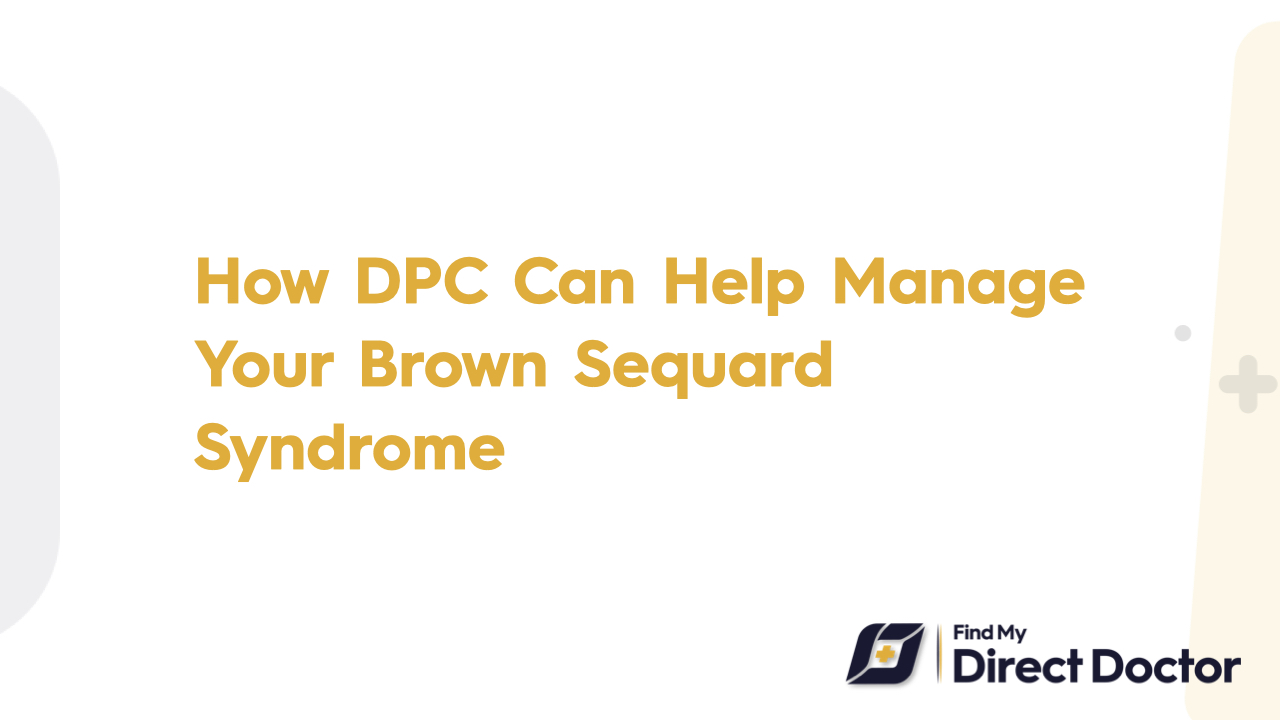



Getting a diagnosis of Brown-Séquard Syndrome (BSS) changes your life. This rare spinal cord injury can happen in a flash, but the road to recovery is long and full of specialists, therapies, and possible problems. It can be hard to deal with this new reality because it can feel broken and overwhelming. Direct Primary Care (DPC) is a better way to manage the road ahead. It gives you a stable, coordinating force in your care and a personalized, affordable approach that puts your recovery first, not administrative problems.
Brown-Séquard Syndrome is an uncommon, partial spinal cord injury caused by harm to one side of the spinal cord. This causes a unique and distinct pattern of neurological symptoms below the level of the injury. Some common signs are:
Loss of motor function: Weakness or paralysis on the same side of the body as the injury.
Loss of proprioception means that you can't feel where you are or how things are vibrating on that side.
Loss of Sensation: Not being able to feel pain or temperature on the other side of the body. Long-term risks of uncoordinated care: The prognosis for BSS is frequently positive; however, recovery may be hindered by secondary complications if not addressed proactively. These include bed sores, which happen when you can't move around.
Chronic pain and spasticity (very stiff muscles).
Problems with the bladder and bowel that lead to infections.
Autonomic dysreflexia (a sudden, dangerous rise in blood pressure).
Direct Primary Care (DPC) is a membership-based system in which patients pay a monthly fee to see their primary care doctor as many times as they want. DPC's job is to be the "quarterback" for your long-term recovery, making sure that all of your care is coordinated and works well. The initial, acute spinal cord injury needs emergency specialists.
DPC is a game-changer for BSS recovery because:
Care that is coordinated and involves many fields Your DPC doctor is the main point of contact for everyone on your care team. They have time to:
work with specialists to set things up Make sure that neurology, neurosurgery, physical therapy, and occupational therapy can all talk to each other without any problems.
Put care plans into action: Take charge of the full care plans that groups like the American Spinal Injury Association suggest.
Take care of medications: Manage prescriptions for pain, spasticity, and nerve problems, changing them as your needs change.
Monitoring and preventing problems before they happen Your DPC doctor can focus on stopping problems before they start if you see them often and don't rush. This includes:
checking your skin regularly to avoid pressure ulcers.
Taking care of your bowel and bladder routines on a regular basis to avoid infections.
Watching for spasticity and autonomic dysreflexia, giving treatment and information.
Making sure that all preventive care (like vaccinations and screenings) is done, which is often missed in complicated cases.
Ongoing help for a long recovery It takes a long time to get over BSS. Your DPC doctor is always there for you by focusing on your functional goals, like getting back to work or making it easier for you to move around at home.
Helping you deal with the mental and emotional challenges of recovery by giving you psychosocial support and connecting you with resources.
Making decisions together with you and your family so that you can be an active part of your healing.
Case 1: Mark, 35, got a BSS from a bad injury.
His DPC doctor set up his physical therapy schedule, kept track of his spasticity medications, and found a pressure ulcer in its early stages during a routine check-in. This stopped a serious complication that could have delayed his recovery by months.
Case 2: Susan, 58, got BSS from a tumor in her spine.
Her DPC doctor was the main point of contact for her oncology and neurosurgery teams, making sure that her primary health was taken care of during treatment. After the surgery, the doctor was in charge of her rehabilitation plan and pushed for the resources she needed to get better.
Q: Does a DPC doctor fix the first injury to the spinal cord?
A: No. Emergency specialists are needed for the serious injury. DPC is great at managing your long-term recovery and putting together the complicated care team after you are stable.
Q: Is DPC affordable for someone with a lot of health problems?
A: DPC can lower overall costs by avoiding expensive complications, coordinating care so that tests aren't done more than once, and keeping people from going to the ER for things like bladder infections.
Q: What if I need more than one therapist or specialist?
A: This is where DPC really shines. Your DPC doctor is your main point of contact and advocate. They make sure that all of your specialists and therapists are on the same page and following your plan.
Expert guidelines stress how important it is for spinal cord injury patients to get care from a variety of specialists. That's exactly what DPC is made to do. This means for BSS patients:
Centralized Coordination: A single person in charge of a complicated team.
Proactive Complication Management: Stopping secondary problems that get in the way of recovery.
Putting your unique functional goals and health at the center of the care plan is called patient-centered focus.
A dedicated partner can help you get through your recovery.
After being diagnosed with Brown-Séquard Syndrome, things can get complicated, but your primary care doesn't have to be. With DPC, you get a dedicated partner who knows your story, supports your goals, and expertly manages your care at every stage.

Previous Post
Next Post